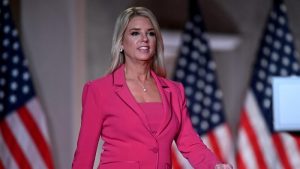America’s gender-gap election has a long history
Unlock the US Election Countdown newsletter for free
The stories that matter on money and politics in the race for the White House
The writer is emeritus professor of history at San Diego State University and author of ‘Fearless Women: Feminist Patriots from Abigail Adams to Beyoncé’
In 1992, Bill Clinton’s strategist made the oft-repeated comment: “It’s the economy, stupid.” For the 2024 US election, an update is needed: “It’s gender, stupid.”
Multiple polls show a yawning gap between the sexes in next week’s election. One found that women favour the Democrat Kamala Harris by 53 per cent to 36 per cent, while men favour Republican Donald Trump in reverse proportion, 53 per cent to 37 per cent.
American elections are often close, so a hot issue can sway independents, who are now the largest bloc at 41 per cent. Rather than taxes and prices, next week’s outcome may turn on whether voters can stomach a woman as president. Harris’s problem is the visceral unease with which many have viewed political women since the American Revolution.
It was Abigail Adams who first proposed new laws to alleviate women’s oppression in 1776. John Adams, the Founding Father and later president, ridiculed his wife and said he could not “but laugh” at her disloyal, preposterous notion. Privately, he warned a fellow legislator to tread cautiously or “Depend upon it, sir, women will demand a vote.”
Loyalists to Britain mocked other female patriots in North Carolina who dumped their tea into the harbour as men had done in Boston. The famous “Edenton Tea Party” cartoon of 1775 lampooned them in terms still familiar today: women who venture into politics are homely, repellent, criminal, abnormal, slutty — or all of the above.
Across the Atlantic in the ensuing French revolution, criticism grew so sharp that feminist organisations were banned outright. The first woman to publish a manifesto demanding equal rights, Olympe de Gouges, was guillotined in 1793.
The conviction that there is something off about women who seek power has surfaced in every generation since, from Abigail Adams to activist Susan B Anthony, cabinet member Frances Perkins to Secretary of State Hillary Clinton. It explains the current Maga conspiracy theory that Michelle Obama is transgender and that Harris slept her way to prominence. Voters simply don’t think of men in such terms.
Trump faces a different problem. Since 2016, he has shown that a candidate can break two established rules around gender and still win, but can this continue?
The first rule dates to the 1820s, known as “The Era of Good Feelings.” After a second war against England in 1812, American politicians buried the vicious divisiveness that had nearly sunk the infant nation. Since then, politicians have mostly adhered to an unwritten code: no public vulgarity towards rivals and no insulting one another’s wives. Trump flouts both customs.
The second unspoken rule was that politicians would treat women as “ladies” to prove themselves “gentlemen”. Instead, Trump has made countless scatological attacks, calling women he dislikes pigs and dogs, and expressing disgust over menstruation and breast-feeding. He also deftly exploits the nation’s long-standing anxiety about feminists — just look at his treatment of Hillary Clinton. Even so, he was elected in 2016.
What could make victory more challenging for Trump in 2024 is the fresh injury added to insult. Manoeuvres over Supreme Court appointments allowed Trump and the Republicans to create a conservative religious majority on the bench. In 2022, the new Court struck down Roe vs Wade and federal protection of abortion.
Thirteen states quickly banned the procedure without exceptions for rape, incest, foetal viability or the physical health of the mother. Twenty-eight enacted gestational limits, some prohibiting abortion after six weeks (when pregnancy is still often undiagnosed), others after 18 weeks (before some lethal abnormalities are typically detected). As a consequence, maternal mortality has risen 11 per cent overall. In Texas, it has risen by 56 per cent.
In Abigail Adams’s day, women of childbearing age were 40 times more likely to die than men, even during wartime. Until the 20th century, men still lived longer than women overall. Science and modern law have only recently allowed more women to survive childbirth and limit their pregnancies, greatly extending life expectancy. Most don’t want to give that — or their freedom to choose — up.
Women can only take so much. Next week, Americans will decide how much that is.
#Americas #gendergap #election #long #history





